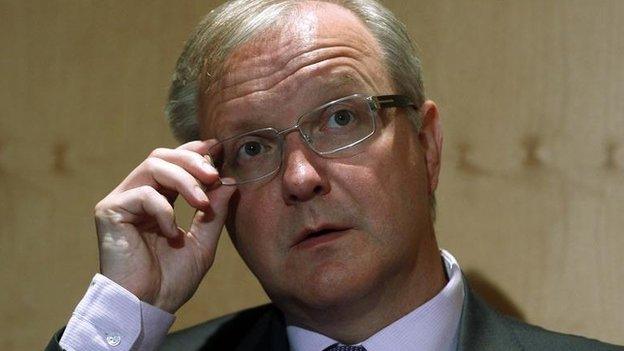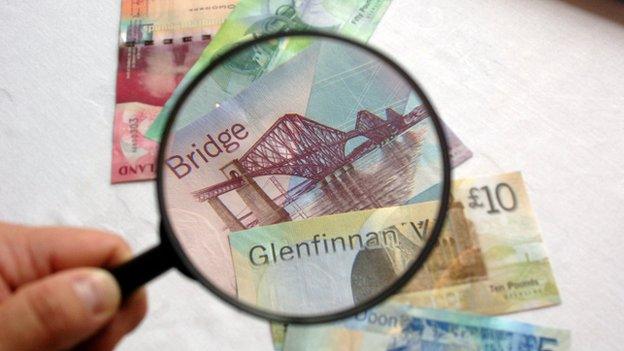Scottish independence: Sterlingisation 'would threaten EU membership'
- Published

Mr Rehn stood down as European Commissioner for economics earlier this year
Continuing to use the pound without a formal currency union could prevent an independent Scotland from joining the EU, it has been claimed.
Former EU economics chief Olli Rehn said it would "simply not be possible" to combine a policy of sterlingisation with EU membership.
Mr Rehn gave his opinion in response to a letter from Chief Secretary to the Treasury Danny Alexander.
But First Minister Alex Salmond said Mr Rehn's claim was wrong.
The three main Westminster parties have repeatedly ruled out the Scottish government's preferred option of a formal currency union with the rest of the UK, a move that has been dismissed by nationalists as political posturing before the referendum.
Both Mr Salmond and and his senior economic adviser Crawford Beveridge have said that sterlingisation - continuing to use the pound without a formal agreement - could be used as a "transitional option".
Other options identified by a fiscal commission, external set up by the Scottish government included establishing a separate Scottish currency or joining the euro.
In his response to Mr Alexander, Mr Rehn said an independent Scotland would have to apply to join the EU under the Treaty on European Union.
He said: "One core part of the economic conditions under the Treaty is that any candidate country must be committed to the Economic and Monetary Union, which implies the will and expected capacity to meet the convergence criteria of euro membership in due course, as well as the existence of a competent monetary authority in the form of an independent central bank.
"As to the question whether sterlingisation were compatible with EU membership, the answer is that this would simply not be possible, since that would obviously imply a situation where the candidate country concerned would not have a monetary authority of its own, and thus no necessary instruments of the EMU."
In reference to the Scottish government's threat to walk away from its share of UK national debt if denied a currency union, Mr Rehn added: "The EU Treaty requires that all member states and candidate countries respect their commitments in public finances, including the deficit and debt targets."

Is the pound the best currency for Scotland?

The question of what currency an independent Scotland would use has been at the heart of the referendum debate.
As part of our Daily Question series, BBC Scotland's economics correspondent Colletta Smith has been weighing up the options.

Mr Rehn stepped down earlier this year as European Commissioner for economic and monetary affairs and the euro.
The Finnish politician had previously served as Commissioner for Enlargement.
In a speech at Chatham House in London on Tuesday evening, Mr Alexander described the idea that Scotland would be able to continue to using the pound after independence as "bonkers".
Pointing to the examples of Iceland and Montenegro, he added: "No country has ever joined the EU while using only the currency of another country at the point of accession.
"There is a strong assumption in the EU Treaties that every member state will have its own central bank, but under sterlingisation Scotland would not have a central bank or control over its monetary policy.
"So, an independent Scotland would face a simple choice - using the pound like Panama uses the dollar, or joining the EU."
But Mr Salmond reiterated his belief that a "common sense agreement" on a currency union would be achieved in the event of a "Yes" vote in the referendum on 18 September.
Mr Salmond added: "In terms of European membership, you don't have to join the euro unless you choose to join the exchange rate mechanism, and we have played out this argument a number of times.
"We've heard a whole range of arguments for what is and what isn't required for EU membership, and none of them have stood up to further examination.
"We require in terms of EU membership a conduct authority and we require financial institutions, but of course we would form these financial institutions as we've stated."
Mr Salmond was speaking on Tuesday during a visit to Eden Mill, a new distillery and brewery in Guardbridge, near St Andrews, where he set out his vision for Scotland's food and drink industry under independence saying it would be the "opportunity of a lifetime" for the industry.
He argued the sector would be boosted by the global publicity generated by a "Yes" vote and pledged to work with businesses on a new world marketing campaign.